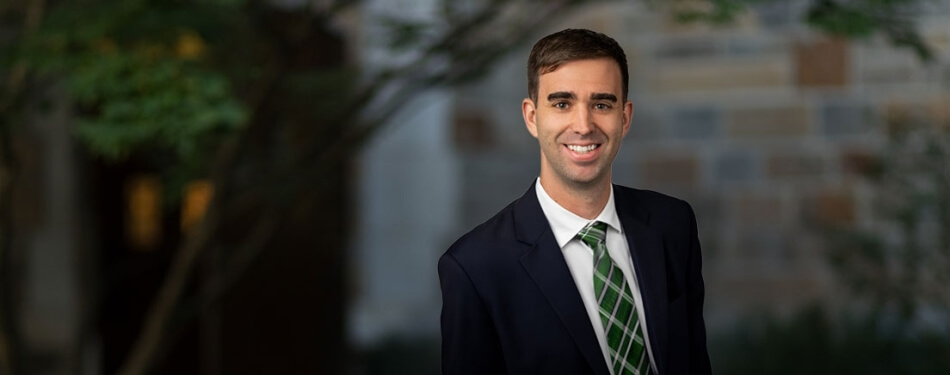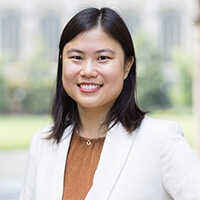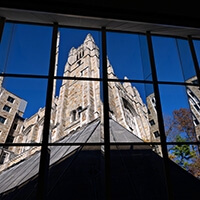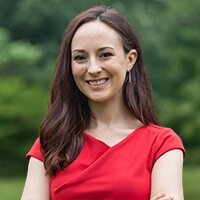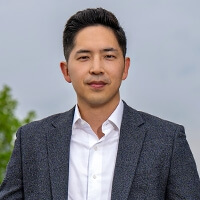When Jacob Altik, ’21, started law school, he wasn’t thinking about clerkship opportunities at all. Yet less than three years past graduation, not only is he a veteran of two federal clerkships, he has been hired for the ultimate such position: clerking on the US Supreme Court.
“When I applied to law school, I had no idea what a clerkship was,” Altik recalls now. “I started figuring it out over the course of the first year, but I didn’t really think it was possible for me to clerk on the Supreme Court. It seemed very, very far away.”
Right after graduation, Altik clerked for the Hon. Joan Larsen—a former Michigan Law faculty member and clerkship adviser—on the US Court of Appeals for the Sixth Circuit and then for the Hon. Neomi Rao on the US Court of Appeals for the DC Circuit. He then accepted a position as an associate in the Washington, DC, office of Weil, Gotshal and Manges, excited by the opportunity to help the firm build out its growing appellate practice.
Shortly after starting at Weil, Altik learned that he had been selected to serve as one of four clerks for Associate Justice Neil Gorsuch in the Court’s 2025–2026 term. It will mark the seventh straight term that a Michigan Law alumnus has clerked at the high court.
The path to clerkships
“It is one of the greatest honors of a lawyer’s career to be selected by a United States Supreme Court justice to serve as their clerk,” said Greta Trakul, the Law School’s director of clerkship advising.
“It is an extremely competitive process that requires many pieces to fall together at just the right time, including excellent academic performance during law school, vigorous advocacy from law school faculty and the lower court judges for whom the applicant clerked previously, and honestly, a decent amount of luck,” Trakul added. “We are proud of our tradition of sending exceptional alumni to work for the nation’s highest court.”
Altik earned a bachelor’s degree from George Washington University and a master’s in political science from the University of New Mexico before turning to law school. At Michigan Law, he served as an editor of the Michigan Law Review and earned Order of the Coif honors.
“A few classes, in particular, were really helpful for clerking,” Altik said. “In Advanced Constitutional Interpretation, Professor Richard Primus taught us different ways to think about the law, and he encouraged a wide variety of opinions, even unpopular ones.
“Another class like that was Presidential Powers with Professor Julian Davis Mortenson. He encouraged debate and very rigorous thinking.”
Heading to the Supreme Court
Beyond his training at Michigan Law, Altik is grateful for the experience he gained in his previous clerking experience.
“The judges I clerked for are utterly brilliant. They taught me how to write and, more importantly, how to think about the law,” he said. “Also, it’s fun to see how the process works. Lawyers make arguments to judges all the time, but if you haven’t been behind the scenes, the results seem to come back from a void, usually a long time later.”
Judge Larsen and Judge Rao were critical in getting the Supreme Court opportunity, Altik said, as was the support of the Michigan Law community. The interview process for the position was rigorous, but he enjoyed the chance to test himself and think on his feet.
“Walking into the Supreme Court Chambers, it was like a different, more serious world, with all the history there,” Altik said. “Just interviewing felt like a weighty thing.”
Looking forward
In his upcoming role, Altik will work directly on the cases before the Court — helping the justices figure out which cases the Court should take up, preparing for oral arguments, and helping to draft opinions.
He’s hoping the experience sharpens his abilities in a couple of specific ways. “Justice Gorsuch is an amazing writer, so I hope to continue to improve my writing skills,” Altik said. “And the way he thinks about cases is extremely precise. I hope to learn from that.”
Altik offered some advice for current and prospective law students, regardless of their career aspirations: Have fun, but take the experience seriously and take full advantage of the opportunity.
“If you take the time to really engage with your professors, who are brilliant people, you will learn a lot from them,” he said. “Even the small issues in contracts or torts really affect the way we organize our lives and society. It’s endlessly fascinating.”

